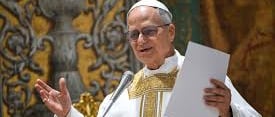The Pope Sounds the Alarm: Pope Leo's Urgent Plea on Artificial Intelligence
The world listened intently as Pope Leo delivered his inaugural public address, and the Holy Father didn't shy away from tackling one of the most pressing and transformative issues of our time: artificial intelligence. His words, delivered with a palpable sense of urgency, called for careful consideration and ethical vigilance as humanity navigates this rapidly evolving technological frontier.
QPN
5/15/20252 min read


While acknowledging the immense potential of AI to improve lives and advance knowledge, Pope Leo articulated several key areas of concern that resonated deeply. He emphasized the critical need to maintain human dignity at the center of AI development and deployment. The Pontiff cautioned against the risk of algorithms that could dehumanize individuals, reduce them to data points, or erode the unique value inherent in every person created in God's image.
A significant portion of his speech focused on the ethical implications of increasingly sophisticated AI. He questioned the moral responsibility of autonomous systems and the potential for bias embedded within their design to exacerbate existing societal inequalities. Pope Leo urged for transparency and accountability in AI algorithms, stressing that decisions impacting human lives should not be left to opaque "black boxes."
The Pope also addressed the profound impact of AI on work and society. He spoke of the potential for widespread job displacement and the need for proactive strategies to ensure a just transition for workers. Furthermore, he highlighted the dangers of AI being used to manipulate public opinion, spread misinformation, and undermine democratic processes, calling for robust safeguards against such misuse.
Drawing upon timeless wisdom, Pope Leo underscored the importance of human connection and community in an increasingly digital world. He warned against the isolation that could arise from over-reliance on AI and the erosion of genuine human interaction. The Pontiff called for a balanced approach, where technology serves to enhance, rather than replace, the richness of human relationships.
Finally, Pope Leo emphasized the need for global dialogue and cooperation in shaping the future of AI. He urged leaders in technology, government, and civil society to come together to establish ethical guidelines and regulatory frameworks that ensure AI remains a tool for the common good, rather than a source of division or harm.
Pope Leo's first public address on artificial intelligence serves as a powerful call to conscience. It is a reminder that while technological progress can offer incredible benefits, it must always be guided by a strong moral compass and a deep respect for the inherent worth and dignity of every human being. The questions he raised today will undoubtedly shape the ongoing conversation about AI and its place in our shared future. The world now has a clear and compelling voice urging caution, wisdom, and a profound commitment to our shared humanity in the age of artificial intelligence.